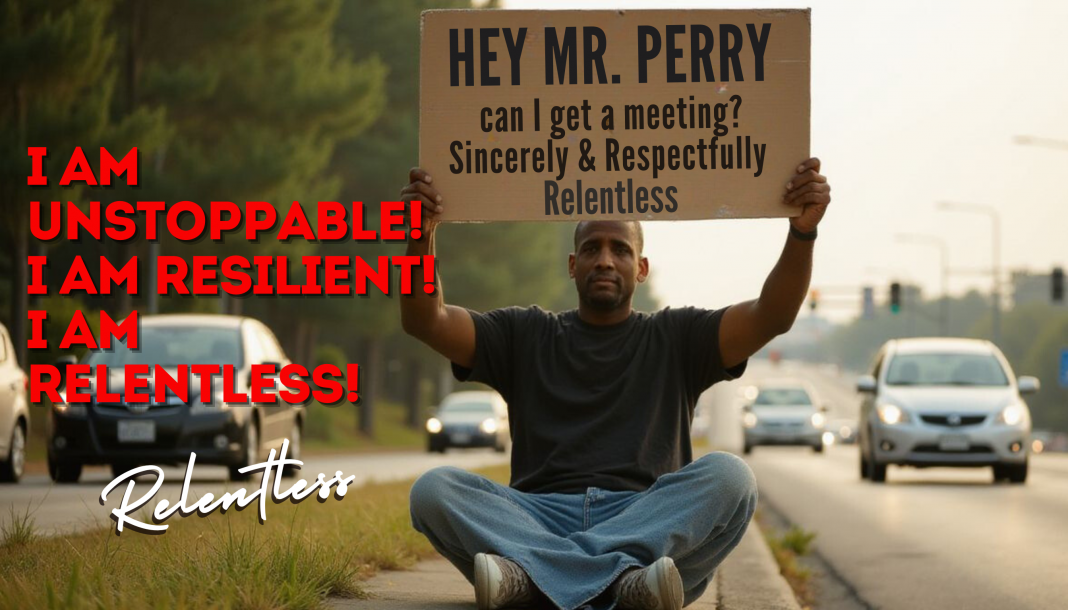Adventurous Kate contains affiliate links. If you make a purchase through these links, I will earn a commission at no extra cost to you. Thanks!
Rome is magnificent in every way possible, from the millennia of history made here to the deliciousness of a perfect cacio e pepe pasta. There are so many things to do in Rome, from the Colosseum to the Vatican Museums to the Trevi Fountain and the Spanish Steps.
Rome is so overwhelming, in a good way, that I’ve written this guide to figure out exactly what you want to do in this city!
I’ve been teaching people how to travel better in Italy for more than a decade, and Rome is a place I’ve visited several times over the years.
My top recommendation? This is not a city to wing it. It’s so massive and crowded with tourists that you’ll have a much better time if you plan what you want to do beforehand, and reserve the tickets in advance.
There are so many different kinds of trips to Rome you can take. You can go all in on art, like at the Galleria Borghese (my favorite!) and the Vatican Museums. You can be an archaeologist and explore the Roman Forum and the catacombs.
And if you’re interested in Rome’s culinary traditions, WHEW. There are so many outstanding dishes here!
Let’s take a look at the best things to do in Rome!
This post was published in August 2024 and was co-written by Adventurous Kate and Riana Ang-Canning.
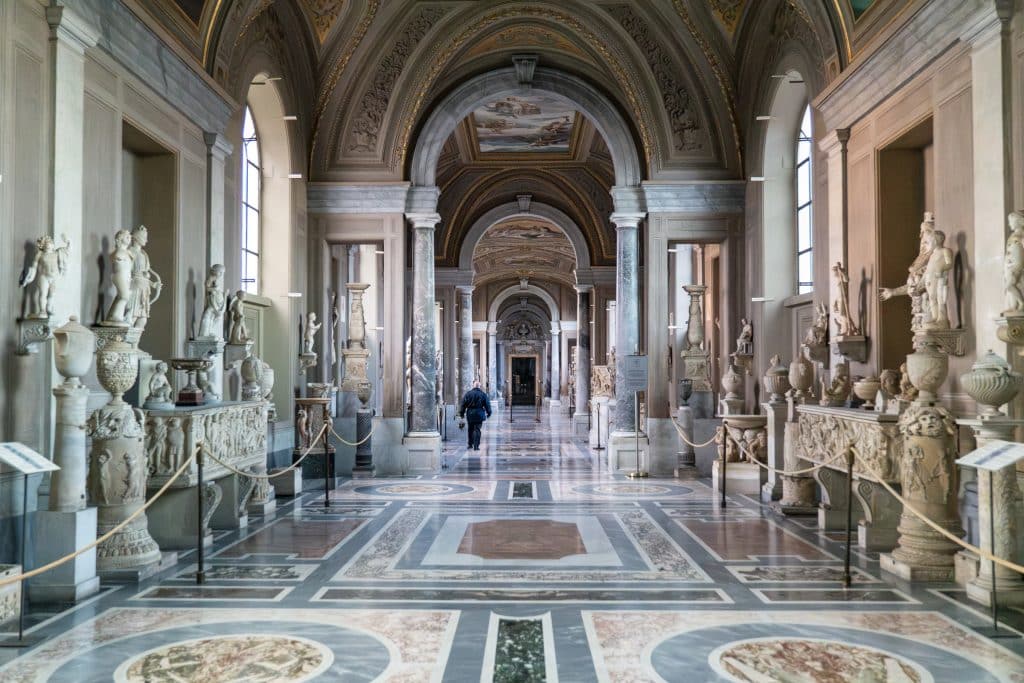
Things to Do in Rome, Italy
Visit the Vatican Museums and the Sistine Chapel
One of my personal favorite things to do in Rome is to cross the border into Vatican City! And no, you won’t need your passport, but Vatican City is home to an extraordinary museum: the Vatican Museums, which house the Sistine Chapel.
These museums are filled with absolutely spectacular art, from Raphael’s School of Athens (a painting you might not know the name of but will definitely recognize), to a hall lined with maps, to exhibits on Ancient Egyptian Art. Each room is more dazzling than the last.
The Sistine Chapel is still one of the most stupefying and moving places I’ve ever visited, showcasing Michelangelo’s incredible frescoes painted in the 1500s. No photos are allowed in here, but you can stare as long as you’d like.
Visiting the Vatican Museums is one of the most popular things to do in Rome, so it’s essential that you book your tour early. I recommend booking a tour with skip-the-line or early access. I would recommend a Vatican Museums tour that also includes St. Peter’s Basilica, an early morning Vatican tour before it gets too crowded, or a VIP after hours tour.
But if you have some extra money to spend and you REALLY want to make your visit to the Vatican special, you can join a Vatican Museums Key Masters Tour. On this tour, you and a small group arrive at 6:30 AM and open the museums for the day with the Key Master. You get to open the doors with the keys and see the lights turned on, nobody else in the museum.
Best of all, you get to be ALONE IN THE SISTINE CHAPEL. It is magical and special and such an incredible experience.
The Key Masters Tour is an expensive tour, but trust me — as a longtime Italy travel expert, this is one of the best things I have EVER done in Italy, and it’s truly a once-in-a-lifetime experience.

Visit St. Peter’s Basilica & St. Peter’s Square
Just outside of the Vatican Museums lies the immense St. Peter’s Square, leading to St. Peter’s Basilica. This basilica is the most important church in Roman Catholicism, and is where the Pope celebrates Mass.
The decor is over-the-top, with Baroque drama from every angle, and so much priceless artwork. Here you’ll also find the tomb of St. Peter. Most famous is Michelangelo’s Pietà, the marble sculpture of the Virgin Mary holding Jesus after his death.
You can also visit the dome of the basilica, which was designed by Michelangelo and completed by Giacomo della Porta. Note that this is a separate ticket. There are 551 steps to the top (you can take an elevator that skips the first 231 steps, but the lines for it are often long), and toward the end, you’ll need to lean at an angle to fit beneath the slanted dome!
St. Peter’s Basilica is free to visit on its own, but know that there are long security lines. If you’d like to tour the basilica as well as visit the crypt and climb the dome, this is an excellent top to bottom tour.

See the Pope at a Papal Audience
For many Catholics and curious travelers, attending a Papal Audience with Pope Francis is a must for a visit to Rome. And if the Pope happens to be in town, you have plenty of opportunities.
First, the Pope usually has a papal audience on Wednesdays from spring through fall at 9:00 AM on St. Peter’s Square. Security opens at 8:00 AM; I would arrive no later than 7:00 AM myself. Bring sun protection (including hats!) as you’ll be outside for a long time. The Papal Audience lasts 90 minutes to two hours.
There is also the Sunday Blessing, which takes place at St. Peter’s Square at noon on Sundays when the Pope is in town. This lasts 15-20 minutes. I would get here two hours ahead of time.
There are also Papal Masses, which require tickets. You can find the full schedule for Papal Audiences and Papal Masses here.

Feel Like a Gladiator at the Colosseum
The Colosseum is the largest ancient amphitheater in the world and the top of many traveler’s lists when planning a trip to Rome. While I can’t promise Russell Crowe and Joaquin Phoenix will be here, it’s hard not to feel like you’ve stepped into the ancient world.
The Colosseum was THE center for entertainment in Ancient Rome — gladiators would fight animals or each other; mock naval battles would take place in here while flooded; and, of course, executions were considered entertainment back then.
The Colosseum is incredibly busy year-round, and I strongly encourage you to either buy skip-the-line tickets or book a tour.
A tour of the Colosseum not only lets you skip the line and learn more from an expert guide, but it also gives you access to areas of the Colosseum you can’t visit alone.
Strike your best gladiator pose on this tour of the arena floor or learn the deep secrets of the Colosseum on this tour that includes underground access.

Visit the Roman Forum
Next door to the Colosseum — and included in your Colosseum ticket — is the Roman Forum. This collection of ancient ruins that includes Palatine Hill, the Arch of Constantine, the Forum of Augustus, and the Trajan Forum.
Here you can walk amongst the ruins and see how citizens of the ancient city used to live. Many of the guided Colosseum tours also include time at the Roman Forum.
You should know that the Roman Forum is huge and sprawling, without much shade from the sun. Make sure you have sun protection and a bottle of water, especially if you’re visiting during the summer! And I recommend climbing up Palatine Hill for some excellent photos of the Forum, including the one above.
To get a little more off the beaten path, check out this guided tour of the Roman Forum and Colosseum, including Caesar’s Palace.

Go on a Walking Tour or Golf Cart Tour
One of my favorite ways to explore a new city, especially one as big and historic as Rome, is on a walking tour. There are so many ancient sites scattered throughout Rome that you wouldn’t even realize are significant — it takes a guide to actually point them out to you!
On this Welcome to Rome walking tour you’ll stroll through the historic city center, see ancient ruins and end your walk with a gelato tasting. And on this Best of Rome walking tour you’ll learn about the city’s history and get access to the Roman Forum.
If you’d rather not walk, you can also explore Rome by golf cart! This is a great option for people who are able to walk, but would prefer not having to walk miles a day.
If you only have one day in Rome and want to see as much as possible, I highly recommend this Rome in a Day tour. This tour includes the highlights of the city, such as the Vatican Museums, Colosseum, Trevi Fountain, and Pantheon, as well as quick access so you don’t waste any of your short time in Rome.

Have Lunch at Mercato Centrale
If you think Mercato Centrale is a big, traditional Italian food market, you might be surprised what you find here. Located right next door to Termini station, Mercato Centrale is a fun and trendy food hall!
You’ll find dozens of restaurant fronts serving dishes both Roman and international. You order, you get a buzzer, and you sit down until it’s ready.
I particularly recommend ordering trappizini from “the trappizino” — these cone-shaped pieces of bread filled with an interesting filling have become a Roman favorite. I love the one with meatballs (polpette) and we had one with an Ethiopian stew once that was so good.
And I also love ordering a pasta carbonara at “the truffle” and having them grate black truffles on top. Decadent? You bet. And not overpowering! Who knew truffle worked so well with carbonara?
I think Mercato Centrale is a great place to go for lunch, especially if you’re doing a half-day trip somewhere by train or you’re otherwise in the neighborhood. (In fact, most recently, Charlie and I had an unexpected layover in Termini station en route from Ponza to Fiumicino Airport — you bet we got lunch here!)

Throw a coin into the Trevi Fountain
The Trevi Fountain is another of the top places you must visit in Rome. This 18th-century Baroque masterpiece is perhaps the most famous fountain in the world, and undoubtedly an icon of the city.
You should keep in mind that the Trevi Fountain is super-crowded year-round, so be prepared for this. If you want to experience the fountain without crowds, your best best is coming early in the morning (but even then, you won’t be the only photographer there).
If you can push your way through the crowds to the water, turn around and toss a coin in your right hand over your left shoulder. It’s one of the most beloved things to do in Rome.
Legend says that if you toss one coin, you will return to Rome; two coins, you will fall in love; and three coins, you’ll marry your love!
PS: They say over 3000 EUR ($3242 USD) is tossed into the fountain each day! And the coins go to a good cause. They are collected twice a week and donated to a supermarket serving low-income Rome residents.

Take in the views from from Castel Sant’Angelo
After a full day of exploring Rome, one of the my favorite places in the city is the terrace of Castel Sant’Angelo. At certain times of year you can catch a sunset view over St. Peter’s Basilica in the distance.
Castel Sant’Angelo, also known as The Mausoleum of Hadrian, has an interesting history in Rome. It’s been used as a mausoleum, castle, fortress, and now, a museum and viewpoint.
The castle is open year-round until 7:30 PM (excluding Mondays), with the final admission at 6:30 PM. You should check the sunset time to see if it will be before then. I most recently visited in March, and the sunset was at 6:21 PM, which gave me plenty of time to capture it. You won’t have as much luck in May, June, or July.
There is a cafe at the top, where you can grab a coffee or some wine and enjoy the view over the Vatican.
To learn more about Castel Sant’Angelo, as well as the Pantheon and historic Rome, check out this guided tour with skip-the-line access — it’s not a sunset tour, though.

Go on a Rome Food Tour
I will go on a food tour literally anywhere in Italy — but Rome has quite a few specialties that taste better than anywhere else in the country. Rome is home to iconic pastas, like carbonara and cacio e pepe; supplì rice balls, different kinds of artichokes, and so much more.
One of the best ways to get to know Rome’s food scene and taste all the local specialties is on a food tour.
Most recently, I went on the Trastevere and Historic Center food tour with Rooftop Spritz, which was SO much fun! I love how local and different this is from other food tours. It concentrates on actual Roman cuisine, with tons of unique snacks and bites, rather than just giving you pizza.
We visited a funky little beer shop, a Neapolitan bakery with pastries that tasted like clouds, all kinds of little shops we wouldn’t have noticed otherwise, and we finished on a rooftop where we made an Aperol spritz while watching the sunset. I loved it!!
Or you can head out on the Trastevere at Sunset food tour to taste local food and wine in one of Rome’s best neighborhoods. This tour is more of a sit-down tour with stops at five places around one of Rome’s coolest neighborhoods.
If you prefer to get a bit off the beaten path, you might enjoy the Testaccio Market food tour, seeing where Romans love to go for the best food in town.
Any of these would be a fantastic way to spend an afternoon or evening in Rome!
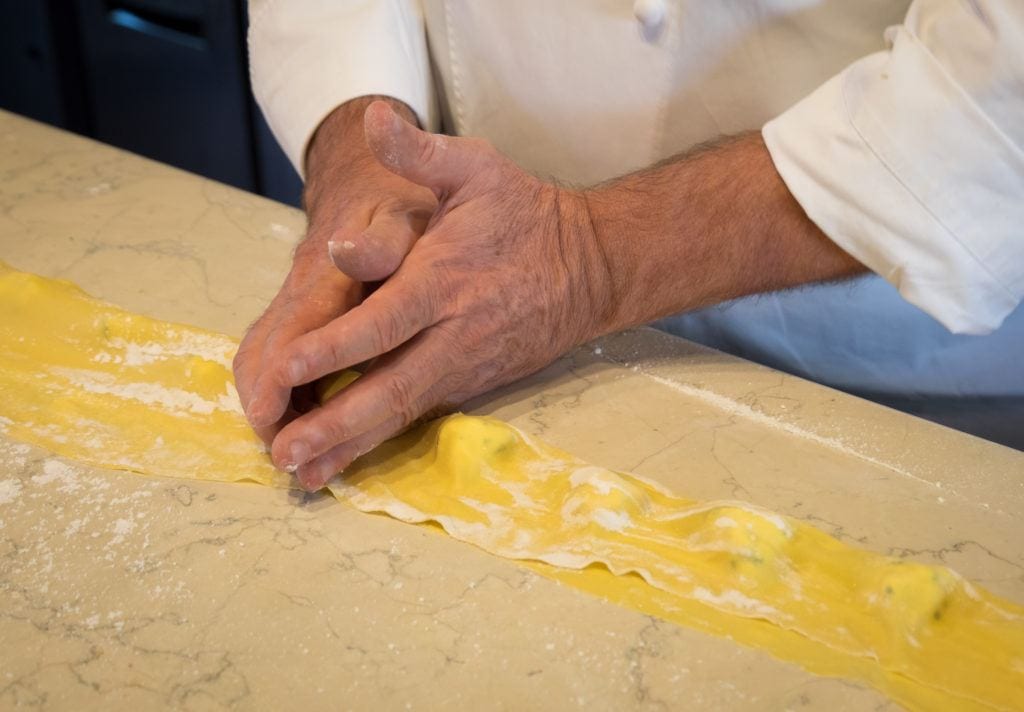
Learn to make pasta or pizza
One of the best souvenirs you can take home is the ability to make a local dish for your loved ones. Pasta and pizza are two very easy dishes to make, but the technique is what makes all the difference. That’s what makes a class worth it!
Take this Rome Pasta-Making Class where you’ll do everything from kneading the dough to perfecting the sauce. Or try out this Rome Pizza-Making Class with an expert chef to guide you. Both classes also include a gelato-making demonstration.
Or if you want to try your hand at a few different Italian specialties, opt for this class where you’ll learn to make fettuccine, ravioli and tiramisu. Either way, your friends will be thanking you when you come home.

Marvel at the Pantheon
The Pantheon is an Ancient Roman temple and Catholic Church whose current building dates back to 126 AD. It’s one of the best-preserved buildings of Ancient Rome and holds the record for the world’s largest unreinforced concrete dome.
Inside the Pantheon, you’ll find tombs (including the tomb of Renaissance master Raphael), chapels, statues, paintings, and more. Of course, you’ll also need to spend a few moments admiring the dome and staring up at the oculus. It’s mesmerizing when it rains!
The Pantheon used to be a free attraction in Rome, but these days they are now charging admission. Entrance to the Pantheon costs 5 EUR ($5 USD) for adults over 25, 3 EUR ($3 USD) for 18-25-year-olds, and is free for those under 18.
PS: Right around the corner from the Pantheon is a nice gelato shop, Cremeria Monteforte.

See Rome’s many other important historical sites
If I did a long description on each of Rome’s historic sites, this guide would be the size of War and Peace. Here are a few more places worth exploring on your Rome trip:
- Capitoline Hill: One of Rome’s seven hills which offers some of the best views over the city, the Palace of Senators and the Capitoline Museums.
- Altar of the Fatherland: Also known as the Wedding Cake, it’s a large monument dedicated to King Victor Emmanuel II, housing museums and a panoramic terrace.
- Largo di Torre Argentina: An open square that includes the remains of four Roman temples and Pompey’s Theatre.
- Temple of Hadrian: Built in 145 AD to honor the Roman Emperor Hadrian, all that remains today are its 11 giant columns. Today it houses Rome’s stock exchange.
- Domus Aurea: The opulent residence of Emperor Nero, which can be explored via immersive reality and video mapping.
- Baths of Caracalla: The towering ruins of Rome’s second largest bathhouse, likely built around 212 AD.
- Santa Maria Maggiore: This is the largest Catholic Marian church in the city and one of the Seven Pilgrim Churches of Rome, famous for its connection to the Virgin Mary and for once receiving a blanket of snow on a summer day.
- San Pietro in Vincoli: This minor basilica and Roman Catholic titular church is famous for housing Michelangelo’s statue of Moses.
- Theatre of Marcellus: An open-air ancient theater that looks similar to the Colosseum. On the grounds you’ll also find the Temple of Apollo Sosianus and the Porticus Octaviae.

Go on a food crawl in Monti
If you’re up for a fun and independent food exploration through a cool neighborhood, I recommend heading to Monti and seeing where the night takes you. My husband is a huge fan of Monti and he brought me on our most recent trip to Rome to show me his favorite spots.
Monti is literally next door to the Colosseum, but you wouldn’t know it — walk a few streets in that direction and you’ll only find a handful of tourists.
So where is worth visiting? We enjoyed wine and a tagliere (meat and cheese platter) at a cool wine bar called Fafiuché, then grabbed some pinsa (Roman-style pizza) at Forno da Milvio that we ate while sitting on the Fountain of the Catechumens, had some wine at Ai Tre Scalini, strolled around eating a bit more here and there, and finished with outstanding gelato at Gelateria dell’angeletto.
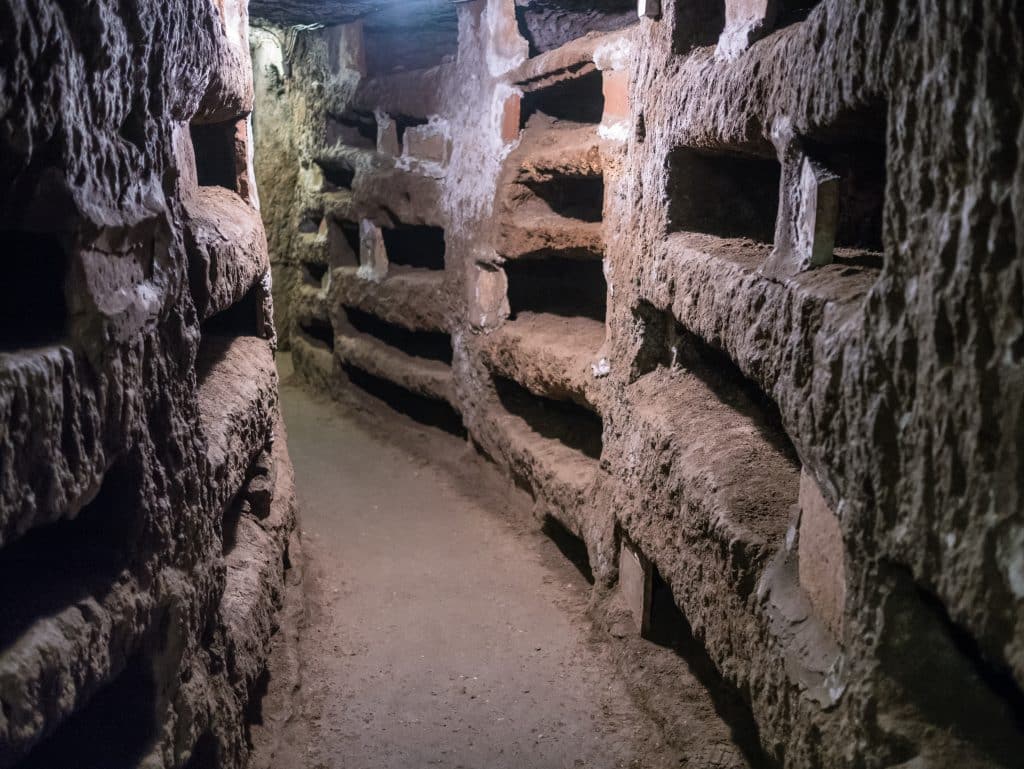
Explore the Roman Catacombs
Rome has a completely different feel when you head underground. The catacombs are the final resting place for many of Rome’s Christians during the early Christian period, back when the religion was illegal, and I think they’re one of the best things to do in Rome if you’re interested in archaeology.
You can visit the catacombs on your own, but a tour with a guide will give you a more in-depth experience. On this Underground Tour of Rome, you’ll start your exploration in the crypt of a local church where bones were used to build the cemetery.
Alternatively, if you want to take your sightseeing up a notch, you can take the exclusive After-Hours Catacombs Tour where you’ll have the crypt and catacombs all to yourselves. Spooky!

Tour the Galleria Borghese and Villa Borghese Gardens
I have yearned to visit the Borghese Gallery in Rome for years — and I finally visited this past year. WHAT AN INCREDIBLE PLACE. It’s now one of my favorite places in Rome.
The Galleria Borghese is a gallery featuring the astoundingly realistic marble sculptures of Gian Lorenzo Bernini.
Bernini is a sculptor from the Baroque period, when art was more realistic and emotional than the preceding Renaissance period. Look at Bernini’s David above — you see how he’s more passionate and realistic and not as perfect or placid as Michelangelo’s Renaissance-era David?
Bernini’s Apollo and Daphne captures the moment Daphne transforms into a tree. The Rape of Prosperina, a violent moment, features fingers sinking into flesh, carved into marble. I’ve never seen it done so well as here.
These sculptures are displayed in a relatively small villa, with gorgeous artwork and frescoed ceilings. You should know that you’ll need to check your bag, even if it’s a small bag. The rooms in the gallery are so small that checking bags is necessary to fit everyone inside.
Start your exploration of Villa Borghese on a Borghese Gallery Tour where an art history expert will guide you through the works of Bernini, Raphael, Caravaggio, Canova and others. Alternatively, tickets to the Galleria Borghese are 13 EUR ($14 USD).
After your tour, I recommend taking a walk through the surrounding gardens, which make a nice escape in the middle of the Ancient City.

See the Spanish Steps
The Spanish Steps are a popular meeting spot and photo op in Rome, thanks to their appearance in classic movies like Roman Holiday. Of course, the significance of the steps goes much farther back than Hollywood, as they were commissioned in the 1720s.
At the base of the steps you’ll see a fountain, Fontana della Barcaccia, and if you climb the 135 steps to the top, you’ll find a great view over the city next to an Egyptian obelisk. Every April and December, the steps are covered in flowers.
Fun fact: While they’re called the Spanish Steps, the staircase was actually commissioned by France. However, the Spanish embassy was located at the base of the steps, and that’s how they got their name.
If you’re planning on doing any luxury shopping in Rome — may I suggest dropping into Fendi, which originated here in Rome? — many of the boutiques are within a short walk of the Spanish Steps.

People-Watch at Rome’s Many Squares
One of my favorite things to do on any trip to Italy is to get some gelato, sit down in a local square, and people-watch. It’s an especially nice thing to do when you’re feeling a bit museum-fatigued!
One square worth visiting is Piazza Navona, which features an oblisk with ornate fountains, surrounded by churches and museums. You could also take a stroll through Campo de’Fiori, home to a lively fresh market during the daytime hours.
The Church of Santo Stefano al Monte Celio, also known as Santo Stefano Rotondo, is one of the oldest circular churches in Rome. It’s set in a garden and is another beautiful place to enjoy a few quiet moments.
Enjoy more great people-watching at Piazza del Popolo (one of the largest open squares in the heart of Rome), Piazza Venezia (a square famous for its chaotic traffic), and Piazza di Spagna (situated at the bottom of the Spanish Steps).

Enjoy the nightlife in the Trastevere neighborhood
Twenty years ago, Trastevere was only visited by Rome tourists in the know. These days, the secret is very much out — but that doesn’t make it any less fun to visit! Trastevere is a fun and local neighborhood with lots of great eateries and nightlife.
From the Ponte Sisto, crossing the Tiber River, walk right into the neighborhood and see what catches your fancy. Via del Politeama, Via del Moro, and Vicolo del Cinque are solid streets to check out.
It’s a great spot to dine on one of Rome’s quintessential pastas — carbonara, cacio e pepe, amatriciana, and alla gricia. Other than that, you’ve got plenty of wine bars, craft breweries, street food sellers, and more! And if you’re in Rome on a Sunday, there’s a lovely flea market here.

Take in the view from Belvedere del Gianicolo
Belvedere del Gianicolo, or Janiculum Hill, is the second tallest hill in Rome and a great place in the city to take in the views from up high. It’s also where a cannon goes off every day at noon!
When you reach the top of the hill, you’ll find an impressive terrace and a large statue dedicated to Garibaldi and his resistance efforts against the French invasion in 1849.
But it wasn’t just the men who resisted. Nearby is another statue of Anita, Garibaldi’s wife, who is shown riding on horseback with a pistol in one hand and her newborn baby in the other. In a city of epic sculptures, that might be the most badass one of all!
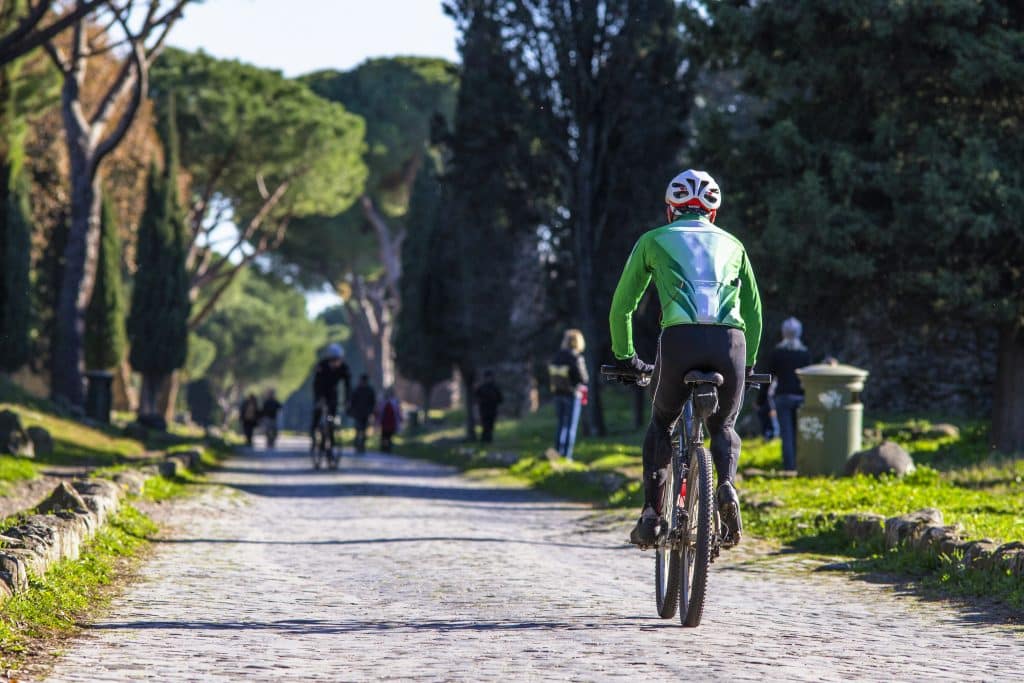
Bike along the Appian Way
Getting on a bike is a fun way to explore a city, but if you’re like me, there’s no way you’re up for riding in a city as big and intense (and traffic-y!) as Rome. Instead, head just outside the city to bike the Appian Way in a much calmer environment that is still VERY Roman.
The ancient Appian Way was the first highway in Europe, built in 312 BC, and eventually connected Rome to Brindisi, a strategic port in the east. Today, the Appian Way is the perfect route to explore ancient Roman sites, such as aqueducts and catacombs, as well as enjoy views of the countryside.
Discover the Appian Way by e-bike on this four-hour tour. While riding the ancient highway, you’ll make stops at catacombs, villas, mausoleums, thermal baths, and more.

Explore Rome by Vespa
Now, if you’ve dreamed of exploring Rome by Vespa ever since first seeing Audrey Hepburn and Gregory Peck do it in Roman Holiday — you can do that, too!
However, I would never recommend this to a first-timer Rome — the traffic situation is just too wild. Instead, I recommend you take a tour with a guide where you can just relax and enjoy the ride.
The Rome Vespa Sidecar Tour leaves in the morning and includes visits to 12 sites in historic Rome — while you ride along in the sidecar. Sure, it might not be exactly the Roman Holiday experience, but it’s much safer than driving yourself, and it’s a ton of fun, too!
Your experienced driver will take you all over Rome while you kick back with your headset in your Vespa sidecar seat. You’ll gain access to roads that tour buses can’t fit down and end your tour with a typical Roman breakfast of a cappuccino and cornetto.
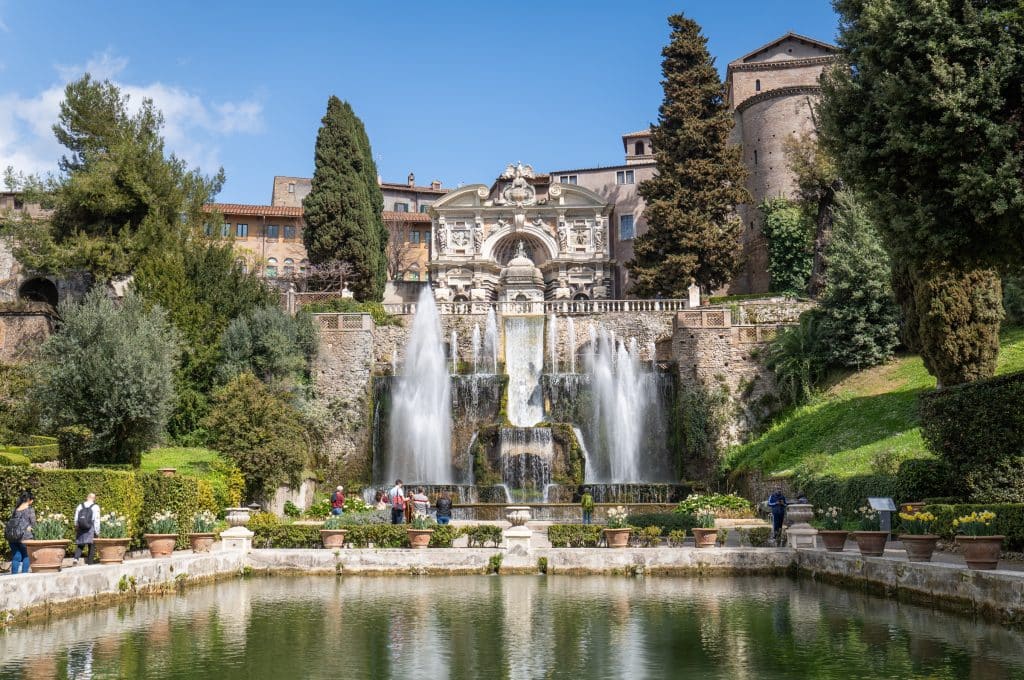
Take a day trip to Tivoli
If you only have time for one day trip from Rome, I think Tivoli makes a great choice. I’ve visited this town a few times to visit the magnificent Villa d’Este, and it makes a nice escape.
While the town is a pleasant place to visit, Villa d’Este is the main draw here. This villa, a UNESCO World Heritage Site, was built for Cardinal Ippolito II d’Este in the 15th century. The interior features absolutely stunning frescoes.
But the real draw, in my opinion, are the gardens in the back. They are beautifully designed with such large fountains, the kind that tower over you and leave you speechless.
On this Tivoli Full Day Trip from Rome you’ll visit Tivoli’s most famous spots, Hadrian’s Villa and Villa d’Este, both of which are UNESCO World Heritage Sites. You’ll learn more about the rich history of the area and have lots of time to explore the villas, fountains, and gardens.
Alternatively, you can visit Tivoli independently — take the train to Tivoli (feel free to just show up and book at the station), walk across the nearby bridge, and walk through town until you reach Villa d’Este (about 20 minutes total). We wanted to visit Hadrian’s Villa as well, but public transportation wasn’t running and Uber wasn’t available, so I recommend booking the above tour if you want to visit both villas in a day.
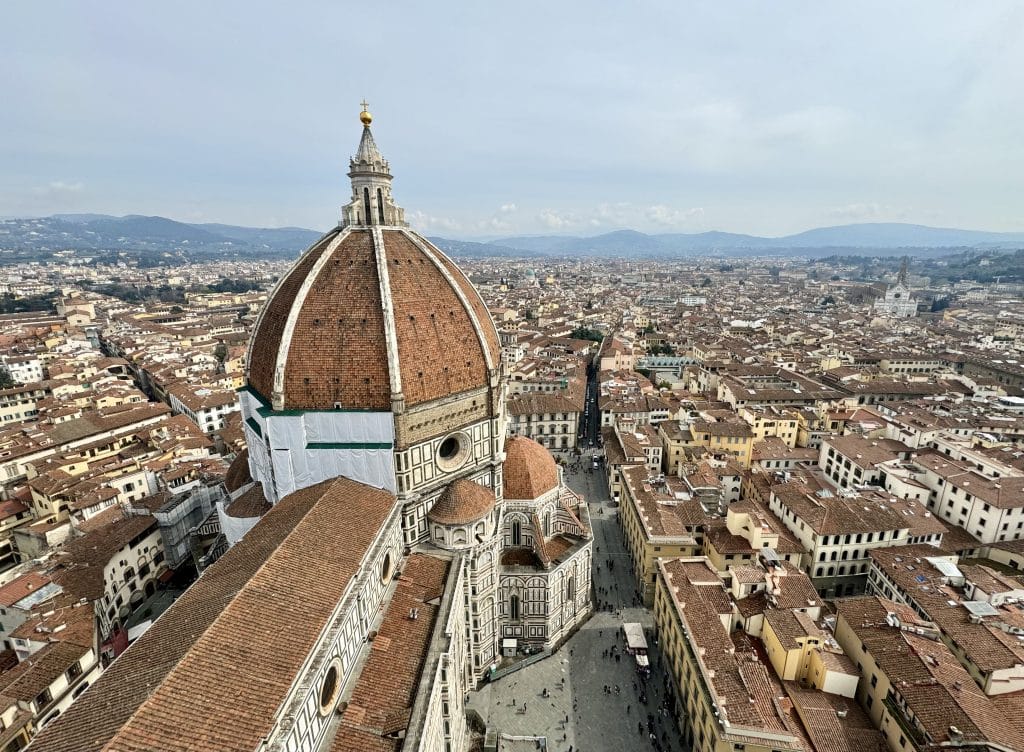
Take a day trip to Florence, Pisa, and Tuscany
Honestly, both Florence and its surrounding region of Tuscany are worth far more than a day trip from Rome — ideally at least three days in Florence itself. But if all you have is a single day free while you’re in Rome, you can make it work.
If you want to travel independently, I recommend you book the train from Rome to Florence in advance. Take the fastest train (90 minutes). Leave early and come back late. I wouldn’t do more than just Florence if traveling independently.
Florence is a small, very touristed city, so I advise making a specific plan rather than winging it. Read through my Florence guide, and book what you can in advance.
If you want to visit the statue of David, climb the Duomo, or visit the Uffizi Gallery, it is critical to book these activities far in advance, as they sell out no matter what time of year it is.
If you want to visit both Florence and a little bit of Tuscany, I recommend booking a tour, as these routes are difficult or impossible to do by public transportation.
On this Florence and Pisa Full Day Tour you’ll head out from Rome to Pisa to take those quintessential photos in front of the Leaning Tower. Then you’ll carry on to Florence to learn about Renaissance art on a guided walking tour, which will include seeing the famous David statue.
Another option is to join this Tuscany Day Trip from Rome tour where you’ll enjoy a scenic ride into the Tuscan countryside, visiting the towns of Monticchiello and Pienza (one of my all-time favorite towns in Italy!). For lunch, you’ll visit a family-run winery in Montepulciano where you’ll learn about wine making and feast on local produce.
Read More: 35+ Best Things to Do in Florence
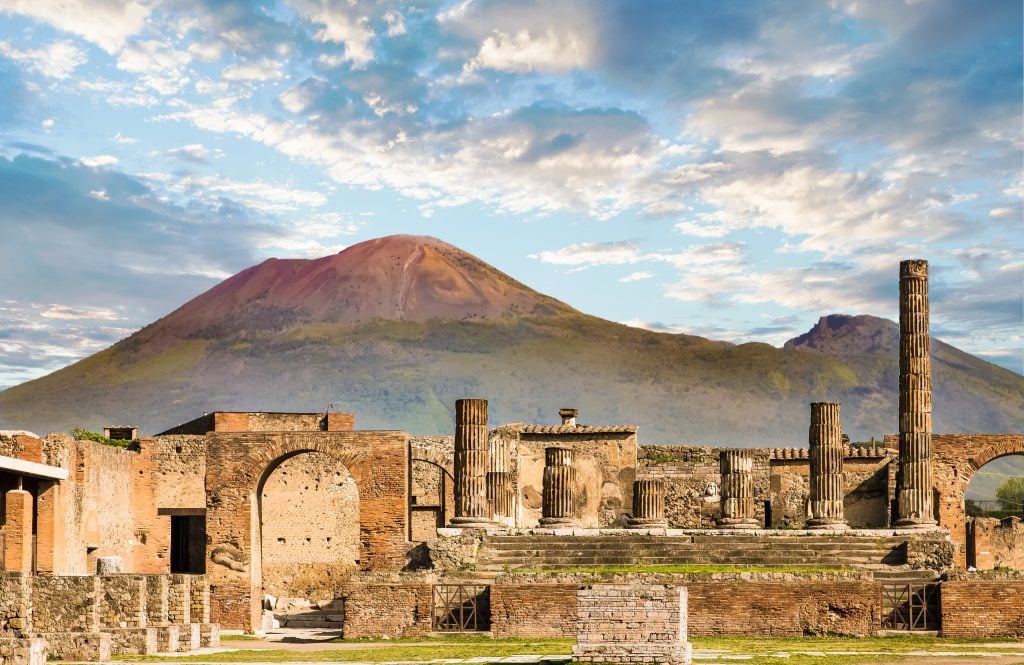
Take a day trip to Pompeii
If you’re REALLY into ancient ruins, you’re probably interested in visiting Pompeii. This is absolutely doable on a day trip from Rome — but keep in mind that Pompeii is near Naples, nearly a three-hour drive away from Rome.
It’s a lot of time on the road, and I know not everyone wants to spend their trip to Italy cooped up in a van. But if this is your one and only chance to visit Pompeii and you’re dying to go, I say go for it!
On this Pompeii Tour from Rome you’ll head out early to arrive in Pompeii ahead of the crowds. A certified guide will lead you through the archaeological site, explaining how the ancient city once operated. From Pompeii, you’ll continue down to the Amalfi Coast for a scenic drive and lunch.
If you’d rather learn more about the eruption that wiped out Pompeii, and sip great wine at the same time, check out this Pompeii tour from Rome includes a visit to Mount Vesuvius and a local winery after your tour of Pompeii.
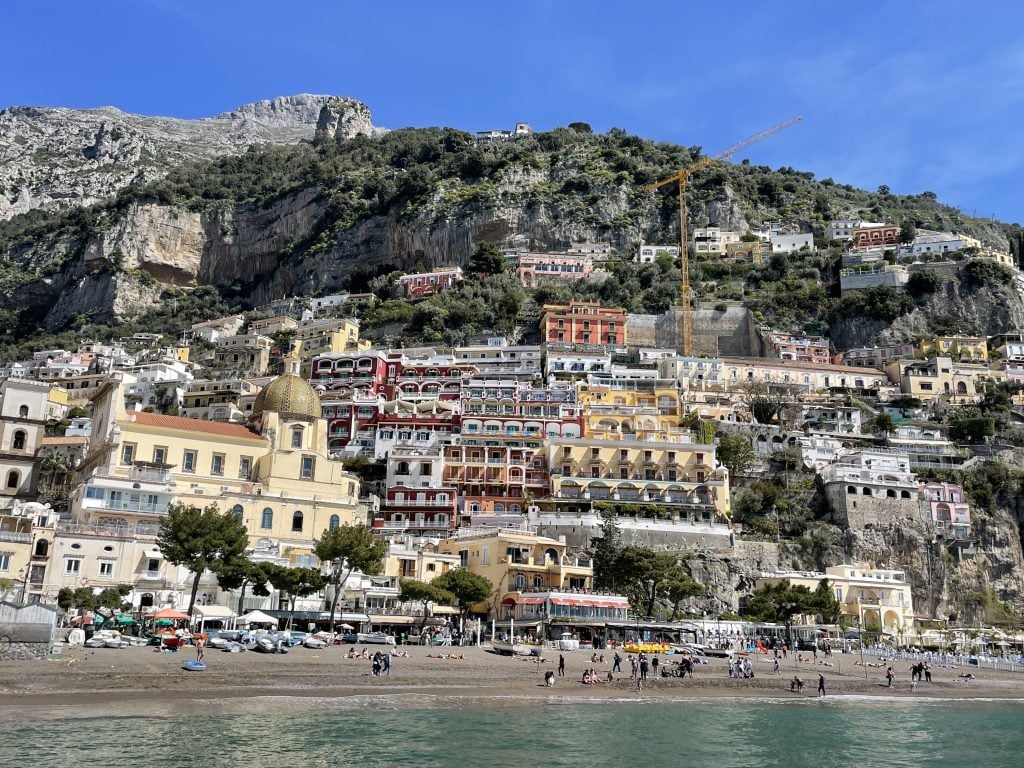
Go boat-hopping in the Amalfi Coast
Once again, the Amalfi Coast is quite far from Rome and a day trip will mean most of your day is spent getting there and back. But if you’re determined to visit the Amalfi Coast during your day to Rome, you can definitely make it work with a day trip.
And you don’t necessarily need to be cooped up in a van. On this Boat-Hopping on the Amalfi Coast tour from Rome, you’ll start by taking a train from Rome to Salerno (just under two hours). Once there, you’ll get on the water and explore the Amalfi Coast by ferry.
Exploring the Amalfi Coast by boat is the way to go — you’ll get so many great pictures! I took the one of Positano above from the ferry.
With stops to taste limoncello in the town of Amalfi and sightsee in beautiful Positano, you’ll be enjoying highlights of the Amalfi Coast in a single day.
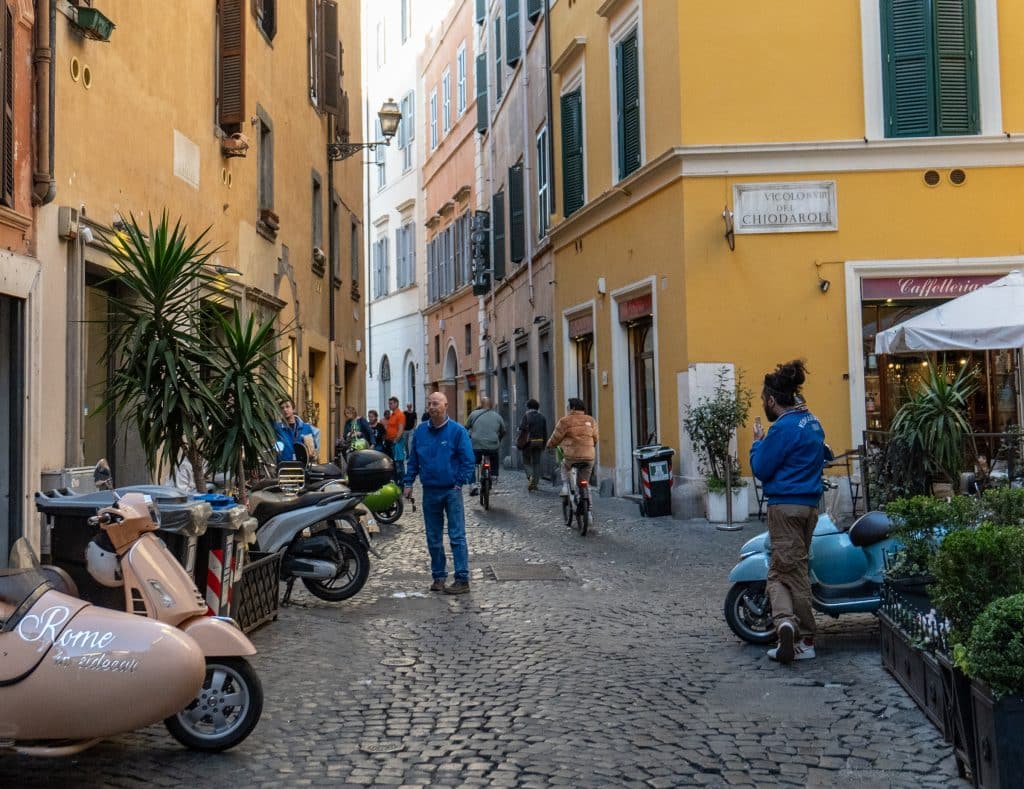
How Much Time To Spend in Rome, Italy
How much time do you need in Rome? Locals would tell you months or years, and that you’d never be done seeing everything!
That being said, I’m here to give you practical advice, and I’d recommend a minimum of three days for visiting the sites in Rome — not counting day trips. Four or five days would be nice, too. If you want to do any day trips from the city, add on more time.
If you only have one day in Rome, I strongly recommend this Rome in a Day tour to maximize your time. It’s a great overview of the city that hits all the highlights on a Rome bucket list, plus it gets you skip-the-line access.
You may even want to go on this tour if you have two days in Rome. You can go on the tour on your first day and then use your second day to explore at your own pace.

How to Get to Rome, Italy
If you’re flying into Rome, the city has two international airports: Fiumicino Airport and Ciampino Airport. Most long-haul flights land at Fiumicino, but some of the budget airlines land at Ciampino.
Pay attention to which airport you’re flying in and out of so you know how to make your way into the city and back to the airport. Both airports have shuttle buses or trains to the city. For ease, you can book a private airport transfer.
Rome is extremely well-connected by train and bus if you’re arriving from elsewhere in Italy or Europe. Roma Termini is the central station of Rome.
In terms of getting around Rome, Rome has a public transportation system with both metro (subway) and bus. Don’t be afraid of taking the bus; they cover a LOT more ground than the metro! Rome also has Uber, but I’ve found that it can take a long time to get one.
I strongly urge you not to rent a car in Rome. You won’t need one for getting around the city, traffic is a madhouse, and parking is both expensive and a hassle.
If you’re planning a larger road trip through Italy, I suggest renting your car before or after the Rome portion of your trip, not during. If you do choose to rent a car, you can find the best prices here.

Where to Stay in Rome, Italy
As Italy’s biggest and most visited city, there are plenty of accommodation options in Rome to fit every budget. All of my suggestions below are in great locations, making it easy to walk or transit to Rome’s top sites.
- Top-Rated Luxury Hotel in Rome: A boutique hotel in Rome’s historic center, The First Arte offers celebrity treatment and world-class service for guests in their prestigious rooms and suites – some of which have terrace hot tubs! Enjoy the lobby bar, Michelin-starred restaurant, excellent location, and beautiful, modern design.
- Top-Rated Mid-Range Hotel in Rome: With stunning views over the city, Hotel Forum offers a perfect option for mid-range travelers looking for style, great location, and comfort. They have rooms for all groups, from singles to families. Enjoy breakfast on the rooftop terrace and cocktails from the bar!
- Top-Rated Budget Hotel in Rome: A great option for budget travelers in Rome is Pantheon Inn. This historic building shows off with antique furniture, delicious breakfast, air conditioning, and the perfect location just behind the Pantheon.
- Click here to check out prices on all hotels in Rome.
Read More: Complete Guide to Where to Stay in Rome

Best Time to Visit Rome
Before planning your trip, you should know that Rome is incredibly busy year-round. I most recently visited Rome in late March, not high season by any stretch, yet it was still so crowded, with long lines everywhere.
The only time of year that will be a bit less crowded in Rome is deep in the winter months — December through February. If you don’t mind chilly weather (though it never snows here), I think winter is an excellent time to visit Rome. It’s far more peaceful.
I strongly recommend not visiting Rome in the summer months. In my opinion, this is the worst time of year to visit. Rome gets super hot and sticky, there’s little shade in places like the Forum and St. Peter’s Square, and the level of crowds is dialed up to eleven.
The shoulder seasons of spring and fall tend to offer a good mix of pleasant weather and smaller-than-summer crowds. I’d recommend early spring and late fall — think March, April, late October, or November. That is my sweet spot for visiting the big hitters in Italy these days.
You’ll also want to keep holidays in mind when planning your Rome trip. Easter is one of the most important holidays in the Catholic calendar, with many devoted followers choosing to mark the holiday in Vatican City.

Is Rome Worth It?
Well, what do you think I’m going to say to this? ROME IS AWESOME! Go and enjoy yourself, eat everything in sight, stand marveling over a piece of artwork for 10 minutes, cross the crowded streets with confidence, go into Fendi to feel some handbags, and drink plenty of Aperol spritzes!
I hope you have a fantastic time in Rome — and that it’s the gateway city that leads to a long love affair in Italy!
Planning a Trip to Italy:
More Cool Places in Northern Italy:
- Three Weeks in Northern Italy: An Itinerary
- Where to Stay in Rome: Best Neighborhoods and Accommodation
- 30+ Best Things to Do in Venice, Italy
- How to Spend 1 Day in Venice, Italy
- 16 Fabulous Day Trips from Venice, Italy
- 35+ Unforgettable Things to Do in Florence, Italy
- Best Day Trips from Florence, Italy
- 18 Best Views in Florence, Italy
- Parma, Italy: A Colorful, Artsy, Delicious Town
- Three Days in the Dolomites: A South Tyrol Getaway
- The Immaculate, Bursting Mosaics of Ravenna, Italy
- 25 Best Food Experiences in Emilia-Romagna, Italy
- 23 Best Things to Do in Bologna, Italy
Best of Southern Italy:
- 28 Fabulous Things to Do in Naples, Italy
- 16 Fun Things to Do in Sorrento, Italy
- Tropea, Italy: A Spectacularly Situated Beach Town
- The Joys and Challenges of Traveling in Sicily
- 22 Beautiful Places to Visit in Sicily
- Where to Go in Eastern Sicily
- 23 Fun Things to Do in Palermo, Sicily
- Complete Guide to the Aeolian Islands, Sicily
- Aci Trezza: A Laid-Back Coastal Town in Sicily
- Visiting Sicily in the Winter: Worth it or not?
- 17 Fun Things to Do in Bari, Italy
- 17 Cool Things to Do in Matera, Italy
- The Stunning Trulli of Alberobello, Italy
- 16 Fab Things to Do in Lecce, Italy
- Experiencing the Carpino Folk Festival in Puglia, Italy
- A Guide to Locorotondo, Italy, Pretty Trulli Town
Have you been to Rome? Share your suggestions!




